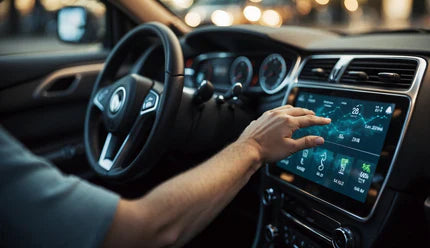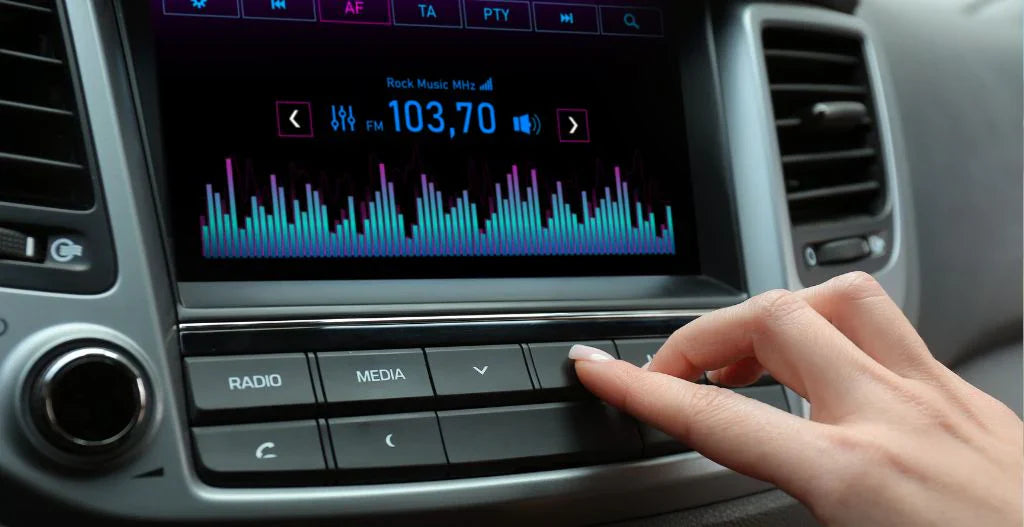If you’re looking to enhance your driving experience, Android Auto is a fantastic option.
Downloading Android Auto allows you to access your Android apps directly on your car display. This includes navigation, entertainment, and messaging apps, all streamlined to make your drive safer and more enjoyable.

Setting up Android Auto is simple.
You can download the Android Auto app from the Google Play Store and connect your phone to your car’s infotainment system.
With features like Google Assistant, you can manage your calls, texts, and media without taking your eyes off the road.
For those who prefer downloading from third-party sites, APKMirror and APKPure offer the Android Auto APK.
This can be a good option if the Play Store isn’t available or if you need a specific version of the app.
Getting Started with Android Auto

To begin with Android Auto, you need to know its basic features and the necessary requirements to set it up in your car.
Overview of Android Auto
Android Auto allows you to use your smartphone apps directly on your car's display. This includes navigation, maps, calls, text messages, and music.
The goal is to reduce distractions while driving, giving you access to your favorite apps using your car's built-in controls and your voice.
Key Features:
- Navigation: Use Google Maps to get directions and traffic updates.
- Communication: Make calls and send/receive messages.
- Entertainment: Play music from apps like Spotify and Google Play Music.
- Voice Control: Use Google Assistant to control features hands-free.
You can interact with Android Auto using your car’s touchscreen, knobs, or buttons, making it versatile and easy to use.
It's designed to help you stay focused on the road while still accessing important apps.
Compatibility and Requirements
To use Android Auto, check that your car and phone meet the necessary requirements. Most modern cars and phones support it, but specifics can vary.
Requirements:
- Phone: A device running Android 5.0 (Lollipop) or higher.
- App: Download the Android Auto app if your phone uses Android 9.0 or below. For Android 10 and above, it’s built-in.
- Car: Your vehicle must support Android Auto. Check your car's user manual or contact the manufacturer.
- Connection: Use a USB cable to connect your phone to the car’s USB port during the initial setup. Some newer models support a wireless connection.
Before starting, ensure your car is in park and the infotainment system is on.
Once connected, follow the on-screen instructions to complete the setup.
How to Download and Install Android Auto

To start using Android Auto, you need to download the app and then set it up in your car. This guide will walk you through each step clearly and concisely.
Android Auto App Download
First, you need to download the Android Auto app.
Open the Google Play Store on your phone. Search for "Android Auto" and tap on the app to open its page. Make sure it's the correct app by Google LLC.
Then, tap the Install button to download the app to your phone.
After the app installs, open it.
You might need to grant some permissions, such as access to your contacts, messages, and location.
These permissions are essential for the app to function properly, letting you use features like navigation and hands-free calling.
Once all permissions are granted, you can move on to setting it up in your car.
Setting Up for the First Time
To set up Android Auto for the first time, you need to connect your phone to your car.
Make sure your car is in park and the infotainment system is on. Use a USB cable to connect your phone to your car’s USB port.
On your phone, open the Android Auto app.
Follow the on-screen instructions, which will guide you through the setup process.
You may need to update some of your phone’s settings to allow for a smooth connection.
Once connected, your car display will show the Android Auto interface.
You can now use various apps like Google Play Music, navigation, and messaging through voice commands or your car's touch screen.
Adjust settings on your phone or car display to customize your experience.
Using Android Auto for Communication and Entertainment

Android Auto helps you stay connected while driving by allowing you to make calls, send texts, and enjoy your favorite music and audio services without taking your focus off the road.
Making Calls and Texting
You can make hands-free calls and send texts using Android Auto.
By simply saying "Hey Google," you can access Google Assistant to place calls or send messages. This ensures you don't have to touch your phone while driving.
Android Auto works seamlessly with messaging apps like WhatsApp.
You can listen to received messages and respond using voice commands. This keeps your hands on the wheel and eyes on the road.
Incoming calls are displayed on your car's dashboard screen, so you can easily accept or decline them with a quick tap.
This integration makes communication more accessible and safe while driving.
Integrating Music and Audio Services
Android Auto supports a variety of music and audio services, making it easy to keep your ride entertaining.
You can use voice commands to play music from apps like Spotify.
Simply say, "Play [song name] on Spotify," and the app will start playing your desired track.
If you enjoy audiobooks, Audible is also supported.
You can continue listening to your book right where you left off.
The ability to switch between different audio apps is smooth and intuitive.
Music playback controls are displayed on your car's screen, making it easy to skip, pause, or repeat tracks without distraction.
This feature keeps your preferred audio content accessible and manageable.
Navigation with Android Auto

Android Auto simplifies your driving experience by integrating powerful navigation tools like Google Maps and Waze. You can use voice commands to navigate effortlessly and keep your eyes on the road.
Utilizing Google Maps and Waze
Google Maps is a reliable option for finding routes, avoiding traffic, and seeing turn-by-turn directions.
It's built into Android Auto, so you don't need any extra setup. Just tap the Maps icon on your car's display to get started.
You can search for locations using keywords or addresses and see points of interest along your route.
Waze offers a user-driven experience, featuring real-time updates on accidents, traffic jams, and police presence.
Waze is also integrated with Android Auto, making it easy to switch between apps using your car’s screen.
Just like Google Maps, you can start using Waze by tapping the icon on your display.
Voice Commands for Navigation
Using voice commands with Android Auto is straightforward and enhances safety.
Simply say, “Hey Google, navigate to [destination]” and Google Assistant will handle the rest. This allows you to avoid typing, keeping your hands on the wheel.
Voice commands are versatile.
You can ask for nearby gas stations, check traffic conditions, or change your current route.
Additionally, Android Auto’s voice recognition is highly accurate.
This ensures that your instructions are understood correctly and executed promptly.
Whether you use Google Maps or Waze, voice commands make navigation seamless, especially when paired with Bluetooth or a wired connection to your car’s stereo.
Conclusion
Android Auto is an excellent tool for enhancing your driving experience by seamlessly integrating your smartphone apps with your car's infotainment system. It simplifies access to navigation, communication, and entertainment features while prioritizing safety through hands-free control and voice commands. Whether you're using it for directions, making calls, or playing music, Android Auto helps keep your focus on the road. With easy setup and wide compatibility, it’s a valuable addition for any driver looking to stay connected and entertained on the go.
Frequently Asked Questions

Learn about updating, installing, and troubleshooting Android Auto on your smartphone or car display. Find out the system requirements and how to use it on your phone screen.
How can I update my existing Android Auto app to the latest version?
To update your Android Auto app, go to the Google Play Store on your phone.
Search for "Android Auto" and tap "Update" if it's available.
Keeping the app updated ensures you have the latest features and bug fixes.
What steps are involved in installing Android Auto on my device?
Download the Android Auto app from the Google Play Store.
Once downloaded, open the app and follow the on-screen instructions.
Make sure your phone is running Android 6.0 (Marshmallow) or higher.
Connect your phone to your car using a USB cable if your car supports Android Auto.
How do I resolve issues when Android Auto is not visible on my phone?
If Android Auto isn't visible on your phone, ensure your device is compatible.
Check if the app is updated. Restart your phone and reconnect it to your car.
For more detailed steps, visit Android Auto Help.
Is there a way to use Android Auto directly on my phone screen?
Yes, you can use Android Auto on your phone screen by opening the app directly after downloading it.
This mode is helpful if your car doesn't support Android Auto. It gives you access to navigation, music, and messaging apps directly from your phone.
Can Android Auto be installed in any car, and how would I do this?
Not all cars support Android Auto.
To check compatibility, visit your car manufacturer's website or the Android Auto compatibility page.
If your car is compatible, connect your phone via USB and follow the prompts on your car display.
What are the requirements to run Android Auto on my smartphone?
Your smartphone needs to run Android 6.0 (Marshmallow) or higher.
You also need a strong internet connection, either Wi-Fi or mobile data, to use certain features.
Download the Android Auto app from the Google Play Store to get started.
Ensure you have the latest version of Google Play Services installed on your phone.








Leave a comment
This site is protected by hCaptcha and the hCaptcha Privacy Policy and Terms of Service apply.